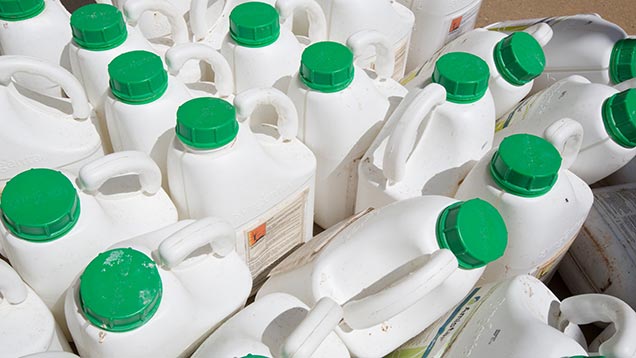Amnesty launched to rid Scotland of illegal pesticides
 (c) Tim Scrivener
(c) Tim Scrivener A scheme has been launched to get rid of illegal pesticides that could be used to poison wildlife.
Launched by the Scottish government on Monday (23 February), the scheme will allow those who know, or suspect, they are in possession of certain illegal pesticides to dispose of them safely and confidentially.
Only selected substances will be accepted through the scheme. These include carbofuran, the most commonly used poison in bird of prey persecution, and other illegal pesticides such as mevinphos and strychnine.
See also: Campaign launched to warn farmers of illegal pesticides
“I would encourage all our members to check their chemical stores. If they find any products that are eligible for disposal via this scheme, they shouldn’t hesitate to take action.”
Rob Livesey, NFU Scotland
These actives have been responsible for the illegal killing of a large number of golden eagles, red kites and other protected raptor species and other wildlife and domestic pets over recent decades.
From 2009 to 2013, there were 96 recorded incidents of illegal poisoning of wildlife in Scotland.
Scottish environment minister Aileen McLeod, who also chairs the Partnership for Action Against Wildlife Crime (PAW) Scotland, said the illegal poisoning of wildlife could no longer be tolerated.
“It is essential that we remove all substances from the countryside that could kill our wildlife and are a risk to people and pets who may accidentally be exposed to them,” Dr Mcleod added.
Some cases of pesticide poisoning are deliberate. But in many cases, farmers will have simply forgotten they have been storing illegal pesticides.
“I would encourage people to carefully and safely check sheds and outbuildings for old stocks of illegal substances,” said Dr Mcleod.
NFU Scotland vice-president Rob Livesey said: ”Farmers are often unsure who they should turn to if they find chemicals of concern – leading many to leave them where they are.
“NFUS therefore commends the Scottish government for funding a straightforward and confidential scheme to deal with particularly problematic and now illegal products.
“I would encourage all our members to check their chemical stores. If they find any products that are eligible for disposal via this scheme, they shouldn’t hesitate to take action.”
The following pesticides will be accepted as part of the scheme:
- Aldicarb
- Carbofuran
- Carbosulfan
- Isofenphos
- Mevinphos
- Sodium cyanide (usually known as Cymag)
- Strychnine
- Most types of bendiocarb
- Banned or expired formulations of chloralose, especially those containing more than 5% chloralose (weaker, ready-to-use formulations are still legally sold for indoor rodent control); and banned or expired formulations of aluminium phosphide.
Further details of substances that will be accepted, and how to make use of the scheme, are available on the PAW Scotland website.
* Farmers and landowners in Scotland who believe they are in possession of banned pesticides should contact the disposal scheme line on 0131 472 4187.
